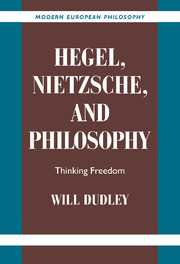Book contents
- Frontmatter
- Contents
- Acknowledgments
- List of Texts, Translations, and Abbreviations
- Introduction: Freedom and Philosophy
- PART I FREEDOM IN AND THROUGH HEGEL'S PHILOSOPHY
- 1 The Place of Freedom in Hegel's Philosophy
- 2 The Freedom of Willing: Hegel's Philosophy of Right
- 3 Freedom beyond Willing: From the Philosophy of Right to Absolute Spirit
- 4 Freedom through Hegel's Philosophy
- PART II FREEDOM IN AND THROUGH NIETZSCHE'S PHILOSOPHY
- Conclusion: Philosophy and Freedom
- Notes
- Index
1 - The Place of Freedom in Hegel's Philosophy
Published online by Cambridge University Press: 09 July 2009
- Frontmatter
- Contents
- Acknowledgments
- List of Texts, Translations, and Abbreviations
- Introduction: Freedom and Philosophy
- PART I FREEDOM IN AND THROUGH HEGEL'S PHILOSOPHY
- 1 The Place of Freedom in Hegel's Philosophy
- 2 The Freedom of Willing: Hegel's Philosophy of Right
- 3 Freedom beyond Willing: From the Philosophy of Right to Absolute Spirit
- 4 Freedom through Hegel's Philosophy
- PART II FREEDOM IN AND THROUGH NIETZSCHE'S PHILOSOPHY
- Conclusion: Philosophy and Freedom
- Notes
- Index
Summary
Hegel thinks that there is nothing more important for us to understand, and nothing that we understand more poorly, than freedom. In fact, his whole philosophical system, in all its incredible breadth and detail, can be understood as a single extended demonstration of the importance and meaning of freedom. Moreover, Hegel's philosophy is not only about freedom, but also claims to be productive of it: in the course of his philosophical investigation of what it means to be free, Hegel arrives at the view that freedom depends upon the practice of philosophy.
Understanding this view, which is the central aim of Part I of this book, requires us to examine what Hegel has to say about freedom, philosophy, and their interconnection. This chapter prepares for that examination by locating freedom within Hegel's system. Section 1 provides a brief overview of the three main parts of Hegel's system: logic, the philosophy of nature, and the philosophy of spirit. Section 2 explicates the concept of freedom developed in the Logic. Section 3 then draws on that logical concept to explain why the entirety of the philosophy of spirit should be understood as an account of freedom. It also briefly discusses the parts of the philosophy of spirit, and the place of the Philosophy of Right within it.
- Type
- Chapter
- Information
- Hegel, Nietzsche, and PhilosophyThinking Freedom, pp. 15 - 27Publisher: Cambridge University PressPrint publication year: 2002



